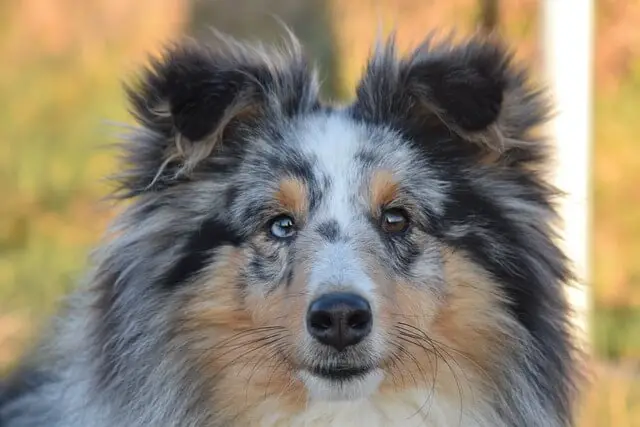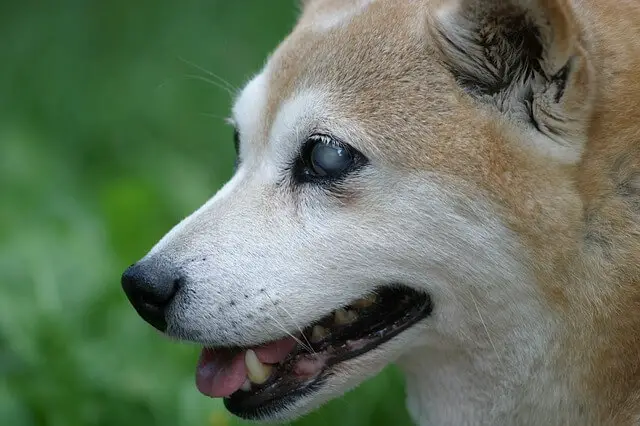Vision Loss in Dogs: How to Know it's Happening?
08.02.2022.
Like us, our dogs can lose their eyesight. There are many possible reasons that might happen, and dog owners might get scared for their dog’s health and wellbeing. It is an issue that can mean significant changes in your dog’s life and your own. Here is why dogs can lose their eyesight, how to spot symptoms, and what you or your vet can do about it.
How can I know if my dog has vision problems?
The first thing most dog owners will notice is significant changes in their dog’s behavior. Dogs will feel a lot less confident, but their other senses will heighten over time. The safest way to know your dog has vision impairment is to get confirmation from your vet. Once your vet examines your dog, you will know for sure your dog has eyesight issues. Other things will include learning the symptoms and signs of vision loss.

Symptoms of vision loss in dogs
The best way to notice your dog’s vision is deteriorating is to notice symptoms of vision loss. The good news is that most dog owners will notice these symptoms pretty quickly. As you can imagine, it is pretty clear that a dog can’t see. Some of the most common symptoms are;
- Bumping into things
- Cloudy appearance of the eyes
- Anxiety or hesitation in unfamiliar places
- Red, puffy, or swollen eyes
- Pawing at the eyes
- Dog gets easily startled
- Dog is unwilling to jump on or off furniture
Most common causes of vision loss in dogs
As we already mentioned, there are different reasons dogs can suffer vision loss. The good news is that some of the reasons are curable, which means the condition will be temporary. Some conditions, like SARDS, are incurable. Here are the most common reasons dogs lose their eyesight;
Cataracts
One of the most common reasons dogs lose their eyesight is cataracts. The dog’s eyes will appear clouded, and if the condition is untreated, it can lead to total blindness. Luckily, some cataracts can be repaired surgically.

Diabetes
More and more American dogs are becoming overweight and developing diabetes. If the condition is left unchecked, it can lead to blindness. Dogs with diabetes are at an increased risk of developing cataracts, which will worsen the dog’s vision.
SARDS
SARDS, or Sudden Acquired Retinal Degeneration Syndrome, is a condition that will cause rapid retina deterioration. It leads to blindness in both of the dog’s eyes. The exact cause is not yet known, and scientists still have to determine if there is a genetic component to SARDS.
Glaucoma
Glaucoma is another potential reason dogs might lose their eyesight. This is a painful condition that can lead to total blindness. If discovered early, glaucoma can be managed with meds. You can read more about it here - Glaucoma in dogs.

PRA
PRA, or progressive retinal atrophy, is a condition that will inevitably cause blindness. It is an inherited condition, which means dogs get it from their ancestors. The good news is that it progresses slowly, so your dog will have time to adjust to the new situation.
How is vision loss diagnosed?
If you noticed signs and symptoms of vision loss in your dog, the best thing to do would be to take them to your vet. Your vet will perform a complete physical examination to determine the exact cause and look for solutions. Your vet can determine if your dog has other conditions that might be contributing to their vision loss. It is most likely the vet will consult a dog ophthalmologist. They can perform tests for the dog’s eyesight which will help them determine the exact cause.
Is vision loss in dogs treatable?
The treatability of a dog’s vision loss depends on the exact cause of the vision loss. Some conditions can be managed with meds or surgically, and some are, unfortunately, incurable. Here are the treatment options for the 5 most common vision loss causes;
Cataracts treatment
Cataracts can be treated surgically. Cataract surgery has a high success rate and can restore the dog’s vision. However, the dog will need delicate post-operative care.

Diabetes treatment
Diabetes can be managed; it cannot be cured. Your dog will need special diets, and you will need to adapt different aspects of your dog’s life. It is most likely your dog will have to lose weight and switch foods. If the dog has developed cataracts, they can be corrected surgically.
SARDS treatment
Unfortunately, SARDS is not treatable. You will have to accept your dog lost their eyesight and start adapting to the new situation.
Glaucoma treatment
Glaucoma cannot be treated, but it can be managed. Vets prescribe dogs medications that can help them deal with this issue. If the eye pressure becomes too high, glaucoma can be treated surgically.
PRA treatment
PRA is not treatable. This condition will cause deterioration of the photoreceptors within the eye and will inevitably lead to vision loss. However, dogs will have time to adapt to the new situation.
In conclusion
Vision loss will undoubtedly affect the dog’s quality of life. However, just because a dog lost its eyesight doesn’t mean it can’t live a happy and healthy life. With enough affection and its owner’s help, the dog can thrive and enjoy the rest of its life. However, some changes will have to be made. Here are a few helpful tips - 7 Tips for Living With a Blind Dog.
World Dog Finder team







Share